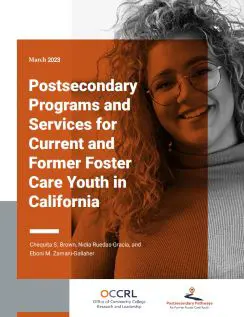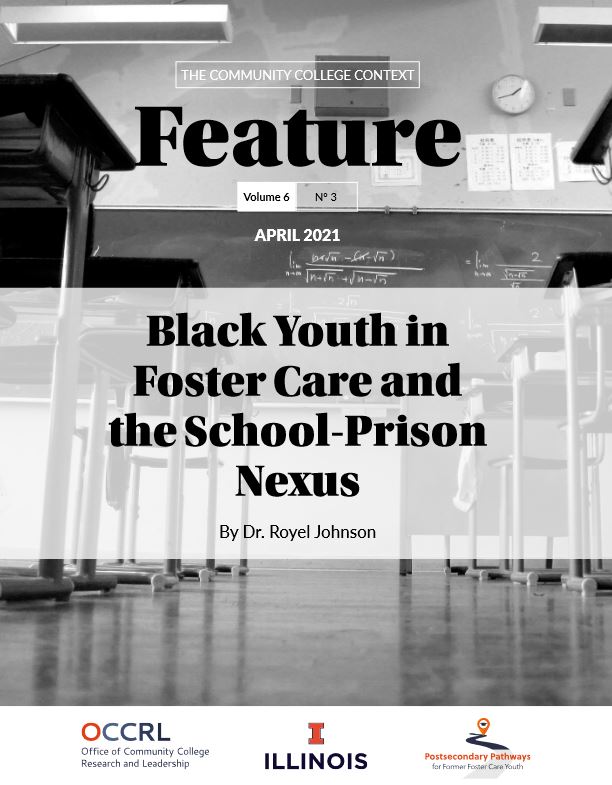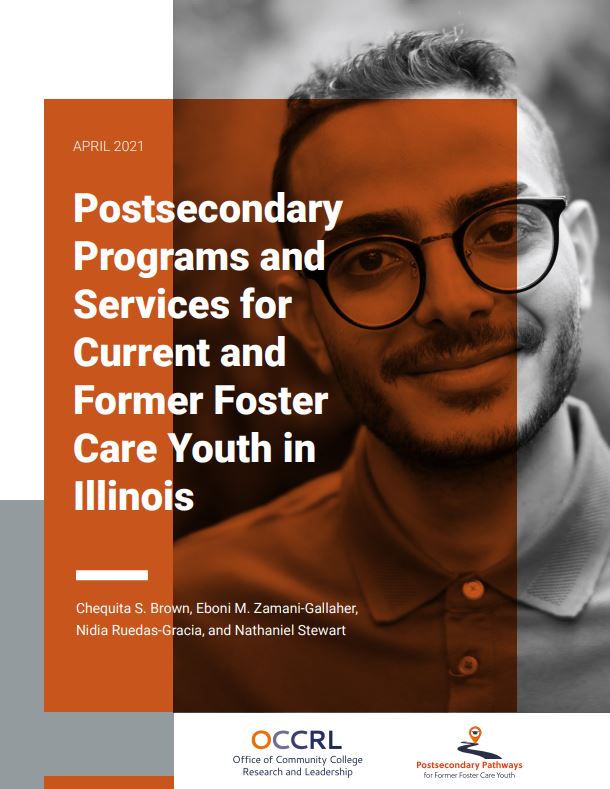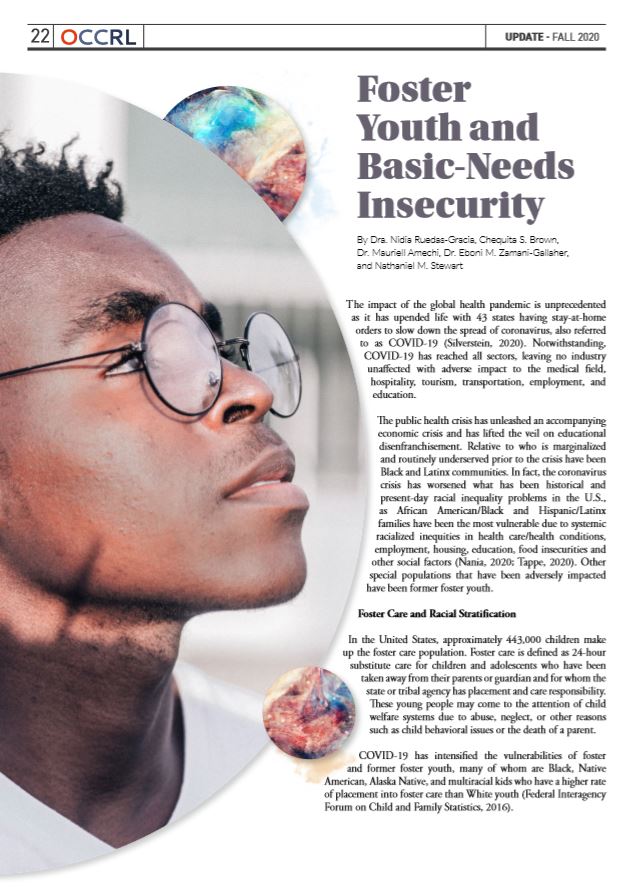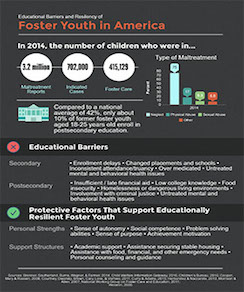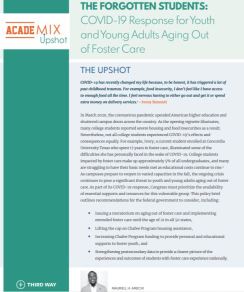Summary
The Postsecondary Pathways for Former Foster Care Youth (PP-FFCY) reflects OCCRL’s commitment to examining and developing postsecondary pathways that support mobility for first-generation, underserved, and minoritized populations, as well as strengthening career pathways to promote seamless transitions from college to careers. This project endeavors to examine postsecondary access, opportunities, and supports for foster youth in Illinois and other states across the county in addressing access and outcomes of FFCY in Career Technical Education (CTE).
Purpose
The Postsecondary Education Pathways for Former Foster Care Youth (PP-FFCY) project is an exploratory study focused on postsecondary pathways for current and former foster youth in Illinois. OCCRL is conducting a comprehensive-needs assessment that provides a descriptive profile of current and former foster youth populations in Illinois; examines postsecondary access, opportunities, and supports for foster youth in Illinois; and addresses disparities in career and technical education (CTE) programs. This project reflects OCCRL’s commitment to examining and developing postsecondary pathways that support mobility for first-generation, underserved, and minoritized populations as well as strengthening and supporting career pathways to promote seamless transitions from college to careers.
Resources
OCCRL aims to increase postsecondary awareness, access, and attainment for current and former foster care youth by providing information on programs and other resources that offer holistic support and services. View the list of postsecondary programs and services.
Podcasts
Strategies to Cultivate a Foster-Friendly Culture on Community College Campuses
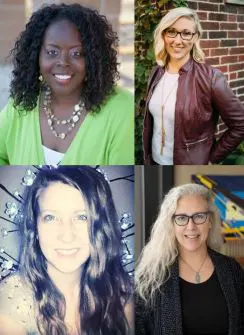 In this episode, Chequita Brown talks with Kate Danielson of the organization Foster Progress, as well as with Anna Wandtke and Tricia Wagner of Rock Valley College in Rockford, Illinois. The group discusses how to cultivate a foster-friendly culture at Illinois community colleges.
In this episode, Chequita Brown talks with Kate Danielson of the organization Foster Progress, as well as with Anna Wandtke and Tricia Wagner of Rock Valley College in Rockford, Illinois. The group discusses how to cultivate a foster-friendly culture at Illinois community colleges.
Navigating College as a Foster Care Alum
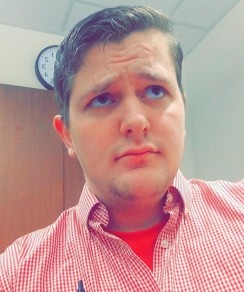 In this episode, OCCRL research assistant Chequita S. Brown talks with Jonathan Stacy, a sophomore at Heartland Community College who is pursuing his studies and a possible career in criminal justice.
In this episode, OCCRL research assistant Chequita S. Brown talks with Jonathan Stacy, a sophomore at Heartland Community College who is pursuing his studies and a possible career in criminal justice.
Listen to the podcast and view the transcript.
Key Elements to Successfully Connecting Foster Care Youth to Educational Resources for Postsecondary Success
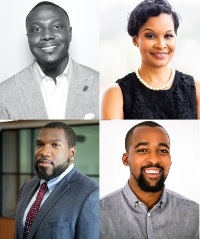 In this episode, Nathaniel Stewart talks with Mauriell Amechi, Regina Gavin Williams, and Blayne Stone Jr. about how the transitions and pathways to postsecondary education are similar and different for Black former foster care students. The scholars also discuss key elements to successfully connect foster care youth to educational resources that help advance the postsecondary education opportunities for this student population.
In this episode, Nathaniel Stewart talks with Mauriell Amechi, Regina Gavin Williams, and Blayne Stone Jr. about how the transitions and pathways to postsecondary education are similar and different for Black former foster care students. The scholars also discuss key elements to successfully connect foster care youth to educational resources that help advance the postsecondary education opportunities for this student population.
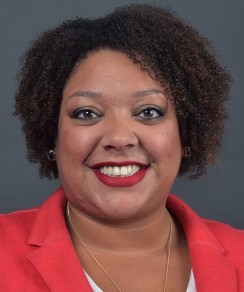
Maddy Day
The Impact of Campus-Based Support Programming on Foster Care Collegians' Postsecondary Access and Retention
In this episode, Chequita Brown of OCCRL talks with Maddy Day about the Fostering Success initiative in Michigan and the impact of campus-based support programming on foster carecollegians' postsecondary access and retention.

Patricia Palmer
How Youth-in-Care in Illinois Can Access Educational Resources to Pursue a Postsecondary Education
In this episode, OCCRL research assistant Chequita Brown continues the conversation on foster care youth by talking about with Patricia Palmer about accessing available resources in Illinois for youth-in-care who want to pursue a postsecondary education.
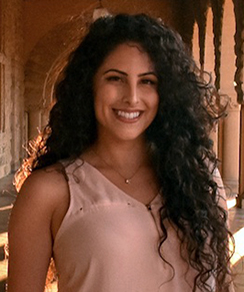
Nidia Ruedas-Gracia
Conceptualizing 'Sense of Belonging' Among Students From Historically Minoritized Racial Groups Within Higher Education
In this episode, Colvin Georges Jr., a research associate at OCCRL, talks with Dr. Nidia Ruedas-Gracia about what it means to have a sense of belonging and discusses her research in this area. They also discuss how a sense of belonging affects college students from historically minoritized racial groups.
Publications
Postsecondary Programs and Services for Current and Former Foster Care Youth in California
By Chequita S. Brown, Nidia Ruedas-Gracia, and Eboni M. Zamani-Gallaher
This brief highlights postsecondary programs and services in California that support youth in care, in addition to young adults who are aging out of foster care. Read more.
Tracking College-to-Career Pathways for Foster Youth
By Chequita S. Brown
In this OCCRL Thought Paper, Chequita S. Brown relates how tracking the data of students with foster care experience helps to recognize them as a legitimate student population. She offers recommendations on how to do this and conveys the many obstacles that can hinder the academic and career success of foster youth. Read more.
Black Youth in Foster and the School-Prison Nexus
By Royel Johnson
In this OCCRL Feature Brief, Dr. Royel Johnson argues that the foster care system, and more specifically congregate care facilities, are part and parcel to the enhancement of carceral state power. Read more.
Postsecondary Programs and Services for Current and Former Foster Care Youth in Illinois
By Chequita S. Brown, Eboni Zamani-Gallaher, Nidia Ruedas-Gracia, and Nathaniel M. Stewart
This research brief provides an overview of programs and services that helps strengthen postsecondary pathways for current and former foster youth in Illinois. Read more.
Foster Youth and Basic-Needs Insecurity
By Dra. Nidia Ruedas-Gracia, Chequita S. Brown, Dr. Mauriell Amechi, Dr. Eboni Zamani-Gallaher, and Nathaniel M. Stewart
This article discusses how COVID-19 has intensified the vulnerabilities of foster youth and former foster youth, many of whom are Black, Native American, Alaska Native, and multiracial children who have a higher rate of placement into foster care than White youth (Federal Interagency Forum on Child and Family Statistics, 2016). Read more.
(From the Fall 2020 UPDATE on Research and Leadership)
Exploring Equity in Postsecondary Education
By Heather L. Fox, Eboni M. Zamani-Gallaher
This chapter examines how postsecondary practitioners are encouraged to work collaboratively with child welfare agencies and other community-based organizations to identify and implement culturally responsive supports for former foster youth to promote early academic achievement. Read more.
The Forgotten Students: COVID-19 Response for Youth and Young Adults Aging Out of Foster Care
By Mauriell H. Amechi
This policy brief outlines recommendations for Congress to consider regarding the country's COVID-19 response, in an effort to prioritize the availability of essential supports and resources for youth and young adults who are aging out of foster care. Read more.
Voices and Viewpoints
Is Your Institution ‘Sharing the Dream’?
Hundreds of professionals from multiple states recently gathered virtually to attend the seventh annual Sharing the Dream conference hosted by the Illinois Association for College Admission Counseling (IACAC).
This year’s event had no registration fee and brought together individuals across educational sectors and community organizations to advance support for undocumented students entering postsecondary education. My interest in the conference itself stems from years of supporting community colleges in the state of Illinois in various capacities. As much of my current work focuses on advancing racial equity in career and technical education (CTE) programs in my home state, I find that institutions aren’t talking enough (or at all) about supporting this specific subpopulation of students.
The state of Illinois has the fifth largest number of undocumented students in higher education at 21,000, with 12,000 identified as eligible for Deferred Action for Childhood Arrivals (DACA) (Feldblum et al., 2020).
In my first breakout session, attorney Rocio Becerril (2021) provided an overview of immigration laws, noting the negative impact of policies implemented under the Trump administration that continue to change under the Biden administration. Critically important to postsecondary education, the Biden administration has fully reinstated the DACA program, and the state of Illinois’ 2019 Rise Act made state funding for higher education available to undocumented and DACA students, as these students remain ineligible for federal financial aid (Becerril, 2021).
While it’s important to note that undocumented students are racially and ethnically diverse, national data demonstrates the disproportionate impact on Latinx students that comprise 65% of DACA-eligible students and 46% of undocumented students in higher education (Feldblum et al., 2020). Asian American and Pacific Islander (AAPI) students make up the next largest group of undocumented students as 17% of DACA-eligible students and 25% of undocumented students in higher education (Feldblum et al., 2020). Eighty-two percent of undocumented students are enrolled in public two- and four-year institutions with community colleges being a primary entry point (Feldblum et al., 2020). The role of community colleges in taking action to alleviate barriers for undocumented students is an integral step toward advancing racial equity in Illinois and across the United States.
In another breakout session, researchers shared their findings from interviews with 35 DACA recipients that identified as Latinx and highlighted how both secondary and postsecondary institutions can better support this population (Albarracin, Buchanan, & Olague-Jamaica, 2021). Seventy percent of students interviewed described their high school counselors as not helpful when it came to providing support for pursuing higher education (Albarracin et al., 2021). Action steps toward better serving undocumented students included:
- Incorporating information for DACA and undocumented students in college information sessions;
- Designating a bilingual (English/Spanish) immigration resource advocate at secondary and postsecondary institutions;
- Connecting students to local, relevant community-based organizations;
- Using inclusive language and providing training to all employees;
- Encouraging and supporting students’ aspirations for postsecondary education despite the challenges; and
- Understanding licensing requirements associated with careers that may serve as barriers for undocumented students (Albarracin et al., 2021).
The conference concluded with a panel of students enrolled at Southern Illinois University-Carbondale. The group members shared their experiences as undocumented students or DACA recipients. Their experiences and suggestions echoed those presented in the previous session. In particular, students noted the importance of educational actors moving from simply answering questions in terms of a “yes” or “no” to becoming advocates for change to alleviate identified barriers within their institutions and beyond. While students noted the importance of training for all faculty and staff on supporting undocumented students and understanding DACA, this alone doesn’t move the needle on closing equity gaps and broadening opportunity in education and employment.
Throughout the day, it was highlighted that one thing institutions do have control over is prioritizing private support and access to scholarships within their foundation offices and broader communities. Given the limitations of financial aid for these students, this is a critical step to providing support.
As I reflect on our work at OCCRL to support Illinois community colleges in advancing racial equity, my learning reinforced the importance of partnerships. These are central to the Pathways to Results model and the Comprehensive Local Needs Assessment process that requires engaging with stakeholders to commit to action steps toward closing equity gaps. It is also relevant to what we have learned in the Program Review Illinois project to advance data-driven and equity-centered program review processes that ensure the alignment of college programs of study with district needs. As institutions are being called upon to take action to close racial equity gaps, it is critically important that they explore issues associated with being an undocumented student and take action to partner with secondary education, community organizations, and workforce representatives to provide the necessary supports that broaden opportunity and socioeconomic mobility. They can start by accessing the tremendous resources from the conference available here.
References
Albarracin, J., Buchanan, R., & Olague-Jamaica, M. (2021, May 19). DREAMers and undocumented students access to higher education: Findings from interviews with 33 DREAMers. Sharing the Dream Conference, Illinois Association for College Admission Counseling.
Becerril, R. (2021, May 19). Immigration 101. Sharing the Dream Conference, Illinois Association for College Admission Counseling.
Feldblum, M., Hubbard, S., Lim, A., Penichet-Paul, C., & Siegel, H. (2020, April). Undocumented students in higher education: How many students are in U.S. colleges and universities, and who are they? The Presidents’ Alliance for Higher Education and Immigration & New American Economy.




